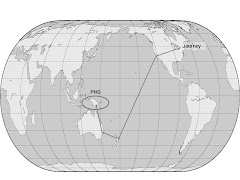Although there are over 800 indigenous languages in
Englis-to-Tok Pisin Translations
Hello = Gude (goo-DAY)
Hello (informal) = Hi. Hai. (HIGH)
How are you? = Yu stap gut? (you stahp goot?)
What is your name? = Husat nem bilong yu? (HOO-zaht naym bee-LONG yoo)
My name is _____. = Nem bilong mi emi _____. (naym bee-LONG mee em ee ______.)
Nice to meet you. = Gutpela long bungim yu. (GOOT-peh-lah long BOONG-im YOO)
Please. = Plis (plees)
Thank you. = Tenkyu (TENK-yoo)
You’re welcome. = Nogat samtin. (NO-gaht sahm-ting)
Yes. = Yes. (YESS)
No. = nogat. (no-GAHT)
Excuse me. = Skius. (skyooz)
I’m (very) sorry. = Mi sori [tumas]
Goodbye = Gutbai (GOOT-bigh)
Goodbye (informal) = Lukim you bihain. (LOO-keem yoo bee-HIGHN)
I can’t speak tok Pisin [well]. = Mi no save[gut] long Tok Pisin. (mee noh SAH-vay long tohk pisin.)
Do you speak English? = Yu save long tok Inglis, a? (Yoo SAH-veh long tohkING-glis?)
Is there someone here who speaks English? = Husat i save long tok Inglis? (hoo-ZAHT ee SAH-veh long tohk ING-glis?)
PNG words for the fruits of the Spirit
Love: laikim tru = love or like very much
Joy: amamas = joy or happiness
Peace: bel isi = restful emotions or being in a state of rest or peace
Patience: no belhat kwik = not getting angry quickly
Kindness: helpim ol man = helping others
Goodness: makim gutpela pasin = do good things, or the habit of doing good
Gentleness: I stap isi = being in a state of rest or peace
Faithfulness: wokabaut stret oltaim = walking straight all the time
Self Control: daunim laik bilong olpela bel = down, or suppress the desires of your old self


